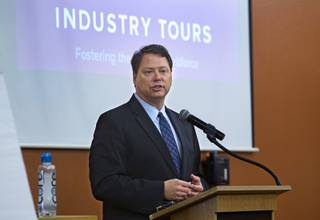
Hannah Jane Romero, center, talks with guests as they tour the Southwest Career and Technical Academy Thursday, Oct. 29, 2015. Hailey Sassone is at right. The Las Vegas Global Economic Alliance (LVGEA) is sending business leaders on a tour of CCSD’s magnet and technical academies in order to show local industry how the district is making strides in addressing southern Nevada’s workforce needs.
Wednesday, May 4, 2016 | 2 a.m.
Career and technical schools are among the highest-performing public schools in Nevada, but is the Silver State getting shortchanged when it comes to federal funding for them?
Republican Congressman Joe Heck says the answer is yes.
Heck, a candidate for Harry Reid’s soon-to-be-vacant Senate seat, revived legislation this week to change a longstanding formula for determining how much funding states receive for career and technical education.
If enacted, the bill would push millions more in federal CTE grants to states with growing populations, like Nevada.
Career and technical programs give students hands-on experience in specific industries like engineering, nursing, law enforcement and hospitality.
Under the current funding structure, states with career and technical programs receive federal grant money depending on their population and poverty levels, but a provision enacted in 1998 guarantees every state receives a minimum amount no matter how those levels change over time.
That disadvantages Nevada, says Heck, which has grown exponentially while the population of other states has shrunk. His bill, co-sponsored by Rep. Raul Grijalva, D-Ariz., would undo that rule.
At an event Tuesday at Veterans Tribute, a career and technical school operated by the Clark County School District, Heck referenced a recent proposal by the Obama administration to use some CTE funds for other education programs.
Heck’s proposal, called the Career and Technical Education Equity Act, originated in 2013 as a way to block that from happening.
“There's not a whole lot of money that comes out of Washington, D.C., when it comes to helping fund career and technical education,” he said. “[The bill] would re-do the formula to make sure that states that saw rapid growth … will not lose their critical CTE funding.”
Nevada receives around $9.7 million a year from the federal program, called the Perkins Career and Technical Education grant. That would jump by $200,000 in one year if the bill is passed, eventually topping out at around $10 million each year.
An independent analysis by the Congressional Research Service found that 26 states — including Arizona, Utah and California — would qualify for more grant money under the new rules.
However, the gains would come at a steep cost to smaller states primarily in the South and Midwest. Wyoming, Vermont and Louisiana would be the hardest hit, losing more than 20 percent of their grant money over the course of five years.
Still, leaders among Nevada’s career and tech community have rallied behind the effort, including Craig Statucki, president of the Nevada Association for Career and Technical Education.
“Under the current guidelines, if federal funding for Perkins is cut … Nevada's federal funding for CTE funding could be reduced significantly, as much as 40 to 50 percent,” Statucki said.
“Districts across the state would no longer be able to provide the unique professional development that CTE teachers require to stay current with industry trends,” Statucki continued. “New CTE programs at traditional high schools could not be developed to meet the needs of the emerging industry sectors of jobs, and some programs would need to be closed because of staffing cuts.”
That scenario is seen as particularly damaging given the state’s recent efforts toward building new industries. Companies like Tesla and Faraday require the kind of skilled workers produced by CTE schools.
Between Reno and Las Vegas, there are 18 schools that offer career and technical programs. The seven CTE schools in Clark County are spread out in each major region of the valley to make them accessible to most families.
Together with magnet programs, CTEs are the undisputed cream of the public school crop in Nevada. They regularly post nearly flawless graduation rates and high test scores.
All seven CTEs in Las Vegas are among the top 10 achieving schools in Clark County, including Advanced Technologies Academy, a Blue Ribbon School and arguably the best school in the state.



Join the Discussion:
Check this out for a full explanation of our conversion to the LiveFyre commenting system and instructions on how to sign up for an account.
Full comments policy